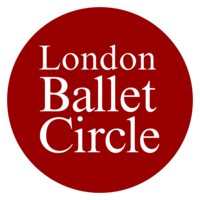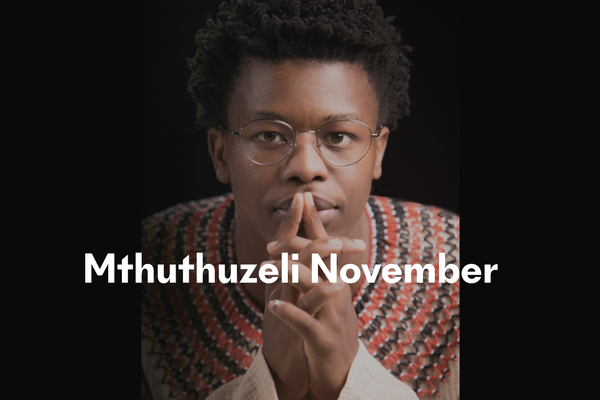Photo credit: Emily Nuttall, courtesy of Northern Ballet
Mthuthuzeli November In Conversation with Chris Marney
7th November 2022
Introducing the interview Susan Dalgetty Ezra said: “since first arriving in the UK Mthuthu has wowed us, not only as a dancer with Ballet Black, but as a choreographer and a composer.”
She then welcomed interviewer Chris Marney, a former member of Matthew Bourne’s New Adventures company, then artistic director of Central School of Ballet and, recently, with Joffrey Ballet Studio in Chicago.
Chris opened the conversation with some biographical details about Mthuthu. Born in Cape Town, South Africa, he had begun dancing at the age of 15 and in 2011 was awarded a scholarship to the Cape Academy of Performing Arts. Four years later he arrived in the UK to join Central School of Ballet and the graduate touring programme at Ballet Central where Chris had first met him.
He had worked with Cape Town Dance Company under the direction of Debbie Turner and in September 2015 joined Cassa Pancho’s Ballet Black as a first-year apprentice. A year later he was promoted to junior artist and then senior artist in 2020. He has since created many roles and has appeared in works by Arthur Pita and Christopher Hampson as well as a very memorable role as the wolf in Annabelle Lopez Ochoa’s Little Red Riding Hood. His first choreographic work was Interrupted for Ballet Black in 2016 and in the last six years he has created what Chris described as a “catalogue of work on diverse stages”. This includes a solo for Precious Adams for the ENB’s Emerging Dancer competition and a pas de deux for Ballet Black’s appearance with British Grime artist Stormzy at Glastonbury. His first UK main stage work Ingoma won both the Olivier Award and Black British Theatre Award for Best Drama Production.
“That was quite an introduction,” said Mthuthu who went on to explain what it was that had brought him to the UK. “It was the end of my post-graduate year at the Cape Academy of Performing Arts. It was one of those moments when you start to think ‘What’s next?’” he said. A close friend in the UK wanted to see how South African dancers would experience being a student in the UK and she invited Mthuthu and a friend to come over. Funding was secured and support provided by Central School of Ballet. So he came, his first visit to the UK, in a cold January! In later years he was to choreograph a work - Sunset in Cape Town - especially for Central School students. “They seemed to have fun with it and I had a great time,” he said.
Chris wanted to know how dancers adapted to his choreographic style in the various companies for which he now produced pieces?
“I was,” said Mthuthu, “thinking the other day about what my role as a South African choreographer is in the dance and ballet world. I like to get to know the people I’m working with so my sessions always start with a circle. I ask each individual how they are doing, how they woke up and what they had for breakfast? Sometimes it takes 45 minutes before we are even rehearsing.” He added: “I tell them how I’m feeling. From this they get to know who I am. They get a glimpse of the fire and what gets me going.”
This process determines how he approaches the choreography by knowing where his dancers are mentally and, on occasion, emotionally. “Working with Ballet Black I have time to explore, to doubt, to completely change the whole piece,” he said. “That’s a luxury I don’t have with other companies. I want to dance for as long as I can and that limits the time I have to work with other companies. Sometimes I have three weeks to create a 30-minute ballet. It limits the time to step back and really process the work.” But, he admitted: “The challenge I quite like that because it’s a very, very focussing thing.”
He said: “It’s an emotional thing when I leave a company because I just talk to everybody. If a dancer is not feeling well, I just sit with them and talk with them. For me, that’s what dance has always been like. I’ve always approached it on a human-to-human level.”
Chris agreed: “Any choreographer who is empowering them to speak and really invest time and listen to how they are feeling that day does make a massive difference to the work you’re going to put on stage.”
Turning to Ingoma Chris said it was clearly a story that Mthuthu wanted to tell for some time. It was inspired by a South African miners’ strike in 1946 and the piece had won great critical acclaim.
“Ingoma is interesting,” said Mthuthu. “Even to this day I’m surprised with how well it was received.” He described how the genesis for the work was a visit he made to the British Museum to attend a lecture on South African art where he saw a painting called Song of the Pick by Gerard Sekoto. “I was incredibly moved by the painting so I started to dig and dig and I found so much about the South African mining industry and how unfairly these people were treated.” Also, another miners’ strike occured in 2012 and this resonated with him. “I wanted to focus a little less on the miners and more on the families. The burden of knowing that your child was out there fighting for a better future, but there’s a chance that something might go wrong. How does it feel to lose your husband, your sons? I wanted to bring these two worlds together.”
And he said: “When I make a work I always see my mother in them. For her to have gone through raising four boys by herself, it must have been difficult and I wonder, if the lights came on and one of us didn’t come home, what that felt like for her.”
Ingoma was the first time Mthuthu collaborated with somebody to make the music for a piece, something which he has developed in other works as he discovers more about the roots of African music. In The Waiting Game for Ballet Black he also included the voices of the dancers. “It felt as though we were telling our normal workday story because all our voices were infused.”
Another piece – Like Water – was driven by an image of a beaten slave that was displayed at Arts Cape in Cape Town and which he saw regularly. “I thought of what our ancestors had to go through and our relationship with the ocean; a place where we lost so many people and it’s a place that has taken people away from home.” He decided he wanted to create a piece especially for film. “I always think as a choreographer I’m technically a filmmaker,” he said. “I love making films.”
Chris reminded the Zoom audience that a number of Mthuthu’s works, including Like Water and Table Talk, could be viewed on the Ballet Black website. He then mentioned the latest piece, currently being created for a premier at The Barbican on March 8 next year. This will be the story of singer and Black activist Nina Simone.
“I wanted to show her from a different perspective,” explained Mthuthu. “I wanted to show a little bit more of her darker side. There’s less of her music. I didn’t want it to be the greatest hits of Nina Simone.” The 40-minute ballet will star Ballet Black’s Isabela Coracy in the title role. Mthuthu has composed the music himself and has also worked with a young choir from his own South African township.
This reference to his township brought him back to his early development. He used to play football while his younger brother Siphe went to a ballet class. “He came home and said ‘we are doing these things called tendus and pliés’ and everyone at home said ‘what’s that?’ He started showing us and he asked if I could go?”
Mthuthu did go along “to check it out” and met the British teacher. “She couldn’t say Mthuthu and she thought I was saying ‘tutu’ so in her mind it was destined that I was going to be a ballet dancer!” Both brothers shone. Mthuthu coming to the UK and Siphe to join the National Ballet of Canada where he is a now a principal.
A questioner in the Zoom audience wanted to know if Mthuthu did not translate into English spoken words in his pieces in order for an audience to experience mere emotion?
He said he had written the piece concerned, Wailers, as a poem to his mother using the form of words of traditional Xhosa poetry. To translate it to English would have diminished its impact. “The dancers I was working with knew every single word that was being said,” but he added: “I’m looking for a way to evolve my storytelling in a way that’s not leaving you behind.”
As the interview wrapped up Mthuthu said: “Being in the UK as a creative in the last seven years has been beautiful and every time I have to pinch myself to think of the works that we have created at Ballet Black, and the importance of the company’s existence.”
Susan Dalgetty Ezra thanked Mthuthu and Chris for a “very inciteful and incredibly inspirational interview” and she flagged up a film called Beyond Moving that charts Mthuthu’s brother Siphe’s rise from child dance pupil to leading light in the National Ballet of Canada. She commented: “It shows how important dance is to the young people in the townships.”
Written by Phillip Cooper, and edited/approved by Mthuthuzeli November and Chris Marney.
© Copyright LBC




